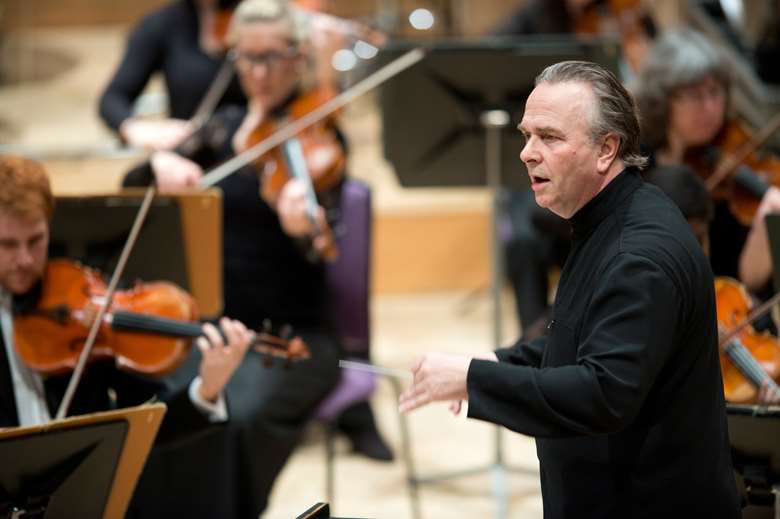The Long View | What will Manchester feel like without Mark Elder?
Andrew Mellor
Tuesday, May 21, 2024
For many of us, the Hallé Orchestra and Sir Mark Elder are one and the same – is anyone else experiencing separation anxiety?

It was last millennium that Mark Elder agreed to be music director of the Hallé Orchestra. When he took up the post, the twin towers were still standing in Manhattan and Baha Men were about to have a UK number one with Who Let The Dogs Out? 24 years on, at the end of this month, Elder will conduct the first of two final concerts as the orchestra’s boss in Manchester.
A year and a half into Elder’s tenure, I got a job tearing tickets at Bridgewater Hall. On my first shift, Elder led the Hallé through Act I of Wagner’s Tristan und Isolde. I’d never witnessed him conduct, but had seen his face in countless brochures and knew him as the former figurehead of an English National Opera I idolised but had never visited. I peered down from the highest point of the auditorium at the figure on the podium, whose name I’d so often heard and read. He looked older than I’d expected, and a touch shorter.
Unbeknownst to me, I was witnessing one of the most remarkable transformations in British orchestral history – proof of the power of leadership. Before Elder, the Hallé was mediocre, miserable, poorly managed and flirting with bankruptcy. After that Tristan, I went to almost every Hallé concert for two years. I heard an orchestra find its feet, find its sound, and find its joy in music again. Five years after I left Manchester, I returned for Elder’s concert Götterdämmerung – not perfect, but still overwhelming. It felt like a good way to round-off my in-person relationship with the orchestra, having started with that chunk of Tristan.
"Elder appears to view music-making with the procedural clarity of a craftsman"
A few years before that, at the London Philharmonic Orchestra where I was on the staff, Elder guest conducted two pulverizing performances of Mahler’s Symphony No 6 – one at the Royal Festival Hall, one the very next day at Brighton Dome. At the Brighton concert, which was far better, he gave a short speech after the interval describing ‘one of the longest symphonies in the repertoire.’ Someone hollered back from the middle of the stalls: ‘I’ve got a bus to catch.’ Elder continued his speech with a wry smile, and was sure not to miss his chance to respond: ‘…and when, sir, you board your bus later, I hope you feel somehow changed.’
 © Russell Hart
© Russell Hart
The first of my interview transcripts with the conductor is dated 28 October 2009 (at the time, the BBC Philharmonic was on the second of the five chief conductors who have spanned Elder’s time at the neighbouring Hallé). Re-reading it now, I note the clarity with which he outlines his characteristic priorities as a conductor: his emphasis on beauty, elegance and colour, often in response to text and language. More interviews followed, including one at the conductor’s Highgate home during which I destroyed a coffee cup and stained the rug on the floor of his study. Elder’s severe, quasi-oratory speaking voice has always reminded me of various headmasters; in the moments after that, he appeared like one. I crept back to my hovel south of the river, hurting with embarrassment.
Like Antonio Pappano – the man defined by the post Elder might, in a parallel universe, have been appointed to – Elder appears to view music-making with the procedural clarity of a craftsman. He colours a score as one might a traditionally animated film – a delicate, pencil-proportioned process in which he expects all involved to continuously refine their skills.
"Elder’s body language has a gravitas easily associated with seniority"
That can sometimes make Elder’s concerts feel a little removed – like demonstrations, museum pieces or even works-in-progress. I learned, eventually, to try to attend Elder’s last rehearsals rather than the concerts that followed (particularly with the Orchestra of the Age of Enlightenment). The thought suggests Elder’s are the values of a disappearing generation of conductors for whom sensitivity was all.
Still, Elder can focus an auditorium like few others. His walk onto the concert platform remains unique: the look with which he greets the audience mixes wonder, gratitude and borderline bemusement as an unusually steady gait appears to pull him magnetically towards the podium. Then there’s his conducting style: head up, eyes wide, mouth open, shoulders forward, generous left hand, baton gripped at hip-level. Like his speech, Elder’s body language has a gravitas easily associated with seniority. I have often wondered what I actually saw at those Hallé concerts in the early 2000s – and what audiences saw from Elder in his twenties and thirties, in New York, London and Birmingham.
I last met Elder in Bergen, where he is principal guest conductor of an orchestra about to say goodbye to its music director Edward Gardner, Elder’s former assistant at the Hallé during my time in Manchester. Elder will preside, more-or-less, over the first year of the interregnum, flexing some areas of hitherto unvisited repertoire. (Senior British conductors working in the Nordic countries appear to be something of a new trend; apparently, this is no longer where where you come to learn your trade, but to extend your horizons.)
‘As time goes by, you need to be choosing who you work with,’ Elder told me in Bergen last year. ‘I would love it if there were a couple of American orchestras I could develop something with.’ After his first music directorship, at the Rochester Philharmonic in New York, that might be a neat closing of the circle. And Manchester? As after the demolition of the Hacienda in 2002, I don’t think it will ever feel quite the same again.




